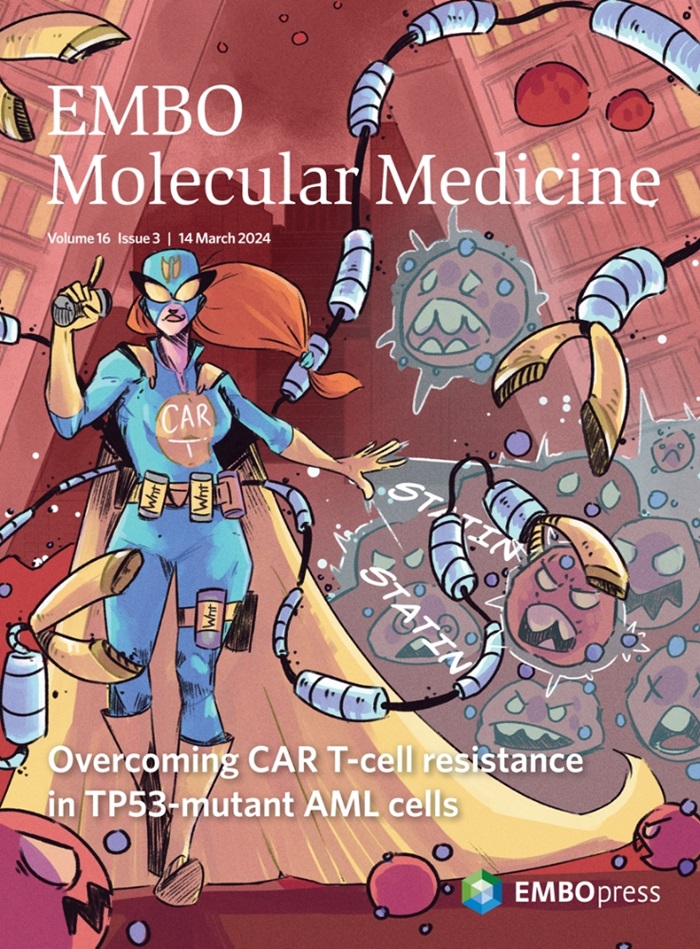Uncovering biomarkers for chronic toxoplasmosis detection highlights alternative pathways shaping parasite dormancy.
IF 8.3
1区 医学
Q1 MEDICINE, RESEARCH & EXPERIMENTAL
引用次数: 0
Abstract
Toxoplasma gondii, a neurotropic protozoan, causes toxoplasmosis, a prevalent zoonotic and food-borne infection, posing significant risks to immunocompromised individuals and congenital cases. The chronic phase, characterized by dormant, cyst-forming bradyzoites, is central to disease progression but is poorly understood due to the lack of serological tests to detect bradyzoite-specific antigens. This study identifies the bradyzoite serological marker (BSM) and cyst-associated BCLA as effective biomarkers for chronic toxoplasmosis. These markers showed high sensitivity and specificity in detecting cyst-bearing mice and had a positivity rate of 30% in humans with prior immunity. Bradyzoite serology helps to discriminate between recent and past infections, with BCLA improving the accuracy of the diagnosis of congenital infections. Mechanistic analyses show that the chromatin modifiers MORC and HDAC3 epistatically regulate BFD1, a key bradyzoite regulator. While BFD1 controls the expression of bradyzoite genes such as BCLA, a specific subset, including BSM, is regulated independently of BFD1. This multilayered regulation complicates the understanding of parasite persistence in humans, but offers promise for improved serologic diagnosis during pregnancy, but also in individuals with mental illness.揭示慢性弓形虫病检测的生物标志物强调了塑造寄生虫休眠的替代途径。
刚地弓形虫是一种嗜神经原生动物,可引起弓形虫病,这是一种流行的人畜共患病和食源性感染,对免疫功能低下的个体和先天性病例构成重大风险。慢性期以休眠、形成囊状的慢殖子为特征,是疾病进展的核心,但由于缺乏检测慢殖子特异性抗原的血清学试验,对其了解甚少。本研究确定慢殖子血清学标志物(BSM)和囊肿相关BCLA是慢性弓形虫病的有效生物标志物。这些标记物在检测荷囊小鼠中具有较高的敏感性和特异性,在既往免疫的人中阳性率为30%。慢殖子血清学有助于区分最近和过去的感染,BCLA提高先天性感染诊断的准确性。机制分析表明,染色质调节剂MORC和HDAC3上位调节慢殖子调控因子BFD1。虽然BFD1控制慢殖子基因如BCLA的表达,但包括BSM在内的一个特定亚群是独立于BFD1调控的。这种多层调控使人们对寄生虫在人类中的持久性的理解变得复杂,但为改善妊娠期间的血清学诊断提供了希望,也为精神疾病患者提供了希望。
本文章由计算机程序翻译,如有差异,请以英文原文为准。
求助全文
约1分钟内获得全文
求助全文
来源期刊

EMBO Molecular Medicine
医学-医学:研究与实验
CiteScore
17.70
自引率
0.90%
发文量
105
审稿时长
4-8 weeks
期刊介绍:
EMBO Molecular Medicine is an open access journal in the field of experimental medicine, dedicated to science at the interface between clinical research and basic life sciences. In addition to human data, we welcome original studies performed in cells and/or animals provided they demonstrate human disease relevance.
To enhance and better specify our commitment to precision medicine, we have expanded the scope of EMM and call for contributions in the following fields:
Environmental health and medicine, in particular studies in the field of environmental medicine in its functional and mechanistic aspects (exposome studies, toxicology, biomarkers, modeling, and intervention).
Clinical studies and case reports - Human clinical studies providing decisive clues how to control a given disease (epidemiological, pathophysiological, therapeutic, and vaccine studies). Case reports supporting hypothesis-driven research on the disease.
Biomedical technologies - Studies that present innovative materials, tools, devices, and technologies with direct translational potential and applicability (imaging technologies, drug delivery systems, tissue engineering, and AI)
 求助内容:
求助内容: 应助结果提醒方式:
应助结果提醒方式:


